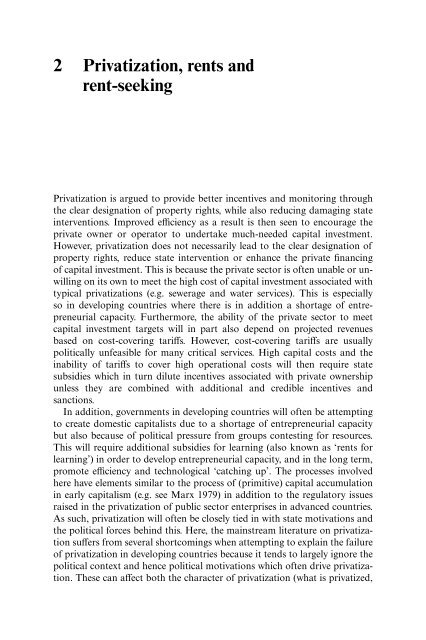PRIVATIZATION Privatization in Malaysia, Regulation, rent-seeking and policy failure
PRIVATIZATION Privatization in Malaysia, Regulation, rent-seeking and policy failure
PRIVATIZATION Privatization in Malaysia, Regulation, rent-seeking and policy failure
You also want an ePaper? Increase the reach of your titles
YUMPU automatically turns print PDFs into web optimized ePapers that Google loves.
2 <strong>Privatization</strong>, <strong>rent</strong>s <strong>and</strong><strong>rent</strong>-seek<strong>in</strong>g<strong>Privatization</strong> is argued to provide better <strong>in</strong>centives <strong>and</strong> monitor<strong>in</strong>g throughthe clear designation of property rights, while also reduc<strong>in</strong>g damag<strong>in</strong>g state<strong>in</strong>terventions. Improved efficiency as a result is then seen to encourage theprivate owner or operator to undertake much-needed capital <strong>in</strong>vestment.However, privatization does not necessarily lead to the clear designation ofproperty rights, reduce state <strong>in</strong>tervention or enhance the private f<strong>in</strong>anc<strong>in</strong>gof capital <strong>in</strong>vestment. This is because the private sector is often unable or unwill<strong>in</strong>gon its own to meet the high cost of capital <strong>in</strong>vestment associated withtypical privatizations (e.g. sewerage <strong>and</strong> water services). This is especiallyso <strong>in</strong> develop<strong>in</strong>g countries where there is <strong>in</strong> addition a shortage of entrepreneurialcapacity. Furthermore, the ability of the private sector to meetcapital <strong>in</strong>vestment targets will <strong>in</strong> part also depend on projected revenuesbased on cost-cover<strong>in</strong>g tariffs. However, cost-cover<strong>in</strong>g tariffs are usuallypolitically unfeasible for many critical services. High capital costs <strong>and</strong> the<strong>in</strong>ability of tariffs to cover high operational costs will then require statesubsidies which <strong>in</strong> turn dilute <strong>in</strong>centives associated with private ownershipunless they are comb<strong>in</strong>ed with additional <strong>and</strong> credible <strong>in</strong>centives <strong>and</strong>sanctions.In addition, governments <strong>in</strong> develop<strong>in</strong>g countries will often be attempt<strong>in</strong>gto create domestic capitalists due to a shortage of entrepreneurial capacitybut also because of political pressure from groups contest<strong>in</strong>g for resources.This will require additional subsidies for learn<strong>in</strong>g (also known as ‘<strong>rent</strong>s forlearn<strong>in</strong>g’) <strong>in</strong> order to develop entrepreneurial capacity, <strong>and</strong> <strong>in</strong> the long term,promote efficiency <strong>and</strong> technological ‘catch<strong>in</strong>g up’. The processes <strong>in</strong>volvedhere have elements similar to the process of (primitive) capital accumulation<strong>in</strong> early capitalism (e.g. see Marx 1979) <strong>in</strong> addition to the regulatory issuesraised <strong>in</strong> the privatization of public sector enterprises <strong>in</strong> advanced countries.As such, privatization will often be closely tied <strong>in</strong> with state motivations <strong>and</strong>the political forces beh<strong>in</strong>d this. Here, the ma<strong>in</strong>stream literature on privatizationsuffers from several shortcom<strong>in</strong>gs when attempt<strong>in</strong>g to expla<strong>in</strong> the <strong>failure</strong>of privatization <strong>in</strong> develop<strong>in</strong>g countries because it tends to largely ignore thepolitical context <strong>and</strong> hence political motivations which often drive privatization.These can affect both the character of privatization (what is privatized,


